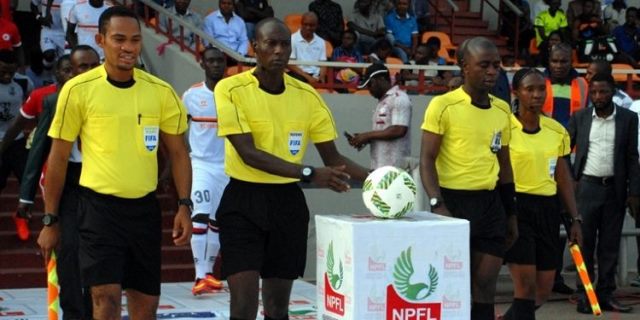By Steve Austin Nwabueze
The legal status of an athlete who earns a living from participating in sport in Nigeria is determined by national legislation and principles developed from the common law and case law. Most athletes are considered employees rather than independent contractors. The legal status is important because it characterizes the contractual relationship between the athlete and the entity for which he or she provides services; the nature of that contractual relationship will determine the rights and obligations that arise. A professional athlete will almost always provide services under a contract with a club, competition organizer, or national federation. [i] Three Nigerian Football clubs, last week, experienced an unprecedented spate of accidents on their way to prosecute league matches for their respective teams. This development has attracted scathing comments against the organizers and the teams involved and raises concerns about employee safety in the Nigerian sports industry. First was Adamawa United whose bus was attacked on the Benin/Ore road by suspected kidnappers with the team’s driver abducted. On Thursday, Wikki Tourists Football Club, Bauchi were involved in a road accident. The bus, which was carrying the players and officials of the Bauchi-based club to Uyo for their NPFL matchday 11 tie against Dakkada FC, caught fire at Hawan Kibo, Riyom Local Government Area of Plateau State. According to a witness account by one of the players in the bus, Damala Ezekiel, the bus lost two tyres before finally going up in flames.[ii]
It would be recalled that exactly 11 years ago 15 footballers of amateur side, Jimeta Football Club Yola, as well as their coach and another official, met their untimely death when their bus crashed into a gully along this same route. Then followed by Kwara United FC of Ilorin who suffered a similar fate on their way from Enugu where they had traveled to prosecute their match against Rangers International Football Club of Enugu with the traveling players and staff escaping death by the whiskers.
The risk of traveling several hours or even days in some cases to prosecute a league game can be staggering and has also called to question, the integrity of such games where a team has little or no recovery time to prosecute important matches. The outcome in most cases is usually a shellacking from the home team due to the fatigue suffered by the visiting team. Undoubtedly, this development raises a number of legal issues from an employment standpoint i.e., the liability of an employer/club for personal injuries suffered by their playing and coaching staff in the course of their employment. Put differently, the work health and safety obligations of a professional football club. This article is in two parts; first, we take a look at Employers’ liability insurance in general while the second part delves into insurance and risk management in sports and the ancillary issues of work health and safety.
The liability of employers for industrial injuries or disease caused to employees continues to be one of the most litigated areas of the tort of negligence. [iii] The Pension Reform Act, 2014 mandates employers of three and above to have in place employer’s liability, (group life) insurance for employees. Employer’s liability insurance in Nigeria provides compensation for the family of employees, in case of untimely death, disappearance, or disability while in service. It is one of the six compulsory insurances in Nigeria. Although a lot of employers are yet to comply with this, it remains a law in Nigeria and applies to both public and private sector employees. This means that employees (and their families) have the right to demand compensation and payment from their employers in the event of injury or death. The penalty for non-compliance with this law is N250,000. In addition, the place of business may be sealed up. One hastens to point out that the existing legislative framework in Nigeria is rather weak to cater for all the conceivable situations under employers’ liability especially as regards the ambit of protection as you have in other jurisdictions such as the UK. One would therefore expect that the scope of protection should only cover situations arising during the employee’s course of employment. Thus, the insurable risks must refer to risks ‘arising out of and in the course of the players’ employment. This principle is in tandem with the common law principle on the point. For example, in Moore v Manchester Liners Ltd[iv], Lord Loreburn defined the course of employment to mean ‘that the event, normally an accident, giving rise to the employee’s claim must arise when the employee is doing what a man so employed might reasonably do during which he was employed and at a place where he may reasonably be during that time to do that thing”. [v]
As a general rule, an employee’s journey to and from his or her place of work is not ordinarily in the course of employment unless the journey is so closely connected with the employee’s work that the general principle ceases to apply. [vi] In Smith v Stages[vii] an employee, a peripatetic lagger had been instructed to work away from his usual workplace at the Drakelow power station in Staffordshire to undertake urgent work at Pembroke power station in Wales. As soon as the work was completed, the employee was driven back to his home in Staffordshire on a Bank Holiday Monday by a colleague so that he could resume work at his usual place of employment the next day. During the journey, the car skidded off the road and crashed into a brick wall. Both men were seriously injured. The plaintiff was paid by his employers for the day he needed to travel back on the same basis as any normal working day. The House of Lords held that at the time of the accident, the plaintiff was acting in the course of his employment. Lord Goff reiterated the fundamental principle as follows:
“The fact that a man is being paid by his employer in respect of the relevant period of time is often important but cannot of itself be decisive …. I approach the matter as follows. I do not regard this case as an ordinary case of travelling to work…in my opinion, in all the circumstances of the case, M was required by the employers to make this journey and it would be proper to describe him as having been employed to do so…the Monday, a normal working day, was made available for the journey, with full pay for that day to perform a task which he was required by the employers to perform…..the journey was therefore made in the course of their employment”. [viii]
On the other hand, in Vandyke v Fender[ix], V & F, who were both employed by the same company as skilled moulders and who worked some distance from home, were provided with a car by their employer so that F could drive himself and V to their place of work. The employer also contributed towards the cost of petrol. During a journey to work, they were involved in an accident caused by F’s negligence in which V was seriously injured. V brought an action in negligence for damages against F and the employer. The employer joined as third party its insurers. one of the issues before the court was whether the employers’ liability policy covered this risk or whether the claim should be directed to the relevant motor insurer. It was held that the employers’ liability insurer was not liable as the accident did not occur during the course of V and F’s employment. The court further held that driving to work is not the same as driving at work and, in any case, V was under no obligation to travel in the car. Lord Denning, M.R held as follows:
“They show, to my mind quite conclusively, that when a man is going to or coming from work, along a public road, as a passenger in a vehicle provided by his employer, he is not then in the course of his employment unless he is obliged by the terms of his employment to travel in that vehicle. It is not enough that he should have the right to travel in the vehicle or be permitted to travel in it. He must have an obligation to travel in it. Else, he is not in the course of his employment. [x]
Whether or not an employee was acting in the course of his employment is a question of facts which as shown by the foregoing cases, is amenable to a number of tests devised by the individual judges. The judge as arbiter is therefore under an enormous duty to take cognizance of the peculiar facts of each case in applying the law.
From the foregoing analysis, it is clear that the playing and coaching staff of these clubs suffered these mishaps on their way to prosecuting an important game for the club. By the terms of their contract, they are obliged to obey lawful instructions from their employers, the clubs. Part of these lawful instructions is to travel in the team buses provided by the employers to prosecute matches for the club. Refusal by any employee to travel in the team’s buses would clearly be interpreted as insubordination by the employee and could be a ground for misconduct. It is therefore clear that the playing and coaching staff are obliged by the terms of their contract to travel in those buses and by road. Accordingly, any resultant injury or loss incurred by the playing and coaching staff would be deemed to have been suffered in the course of employment. A look at the Nigeria Professional Football League Framework Rules shows that there are no elaborate provisions for employer’s liability insurance. as a matter of fact, the only provision on insurance is contained in clause 12.12 of the Commercial Framework of the Rules which obliges the Clubs to ensure that they maintain a medical insurance scheme approved by the LMC and comply with all relevant Pension laws and or special bridging Players pension approved by the LMC. Curiously, clause 6.1.3 of the Framework Rules suggests that this provision is not obligatory when it provides in part that where the club’s medical insurance does not cover medical and dental examinations for a player who is injured or ill, then the club is obliged to maintain a policy upon normal industry terms commonly available within professional football clubs. What is deemed normal industry terms is not defined in the Rules and understandably gives the clubs a leeway to circumvent the existing regulations. Even though the Rules provide that the provisions of the Pension Reforms Act shall apply to the football clubs, it is clear that even the Employer’s Liability Insurance Provisions under the Act are inadequate to meet the demands of global best practice.
Professional sport is work and therefore, an aspect of law that needs to be accorded serious attention is work health and safety. Even though there is an implied term at common law that obliges an employer to exercise a duty of care to ensure the safety of its employees, there needs to be a bespoke legislation that would expressly provide that those conducting a business owe a duty of care to ensure the safety of its workers and to exercise due diligence in taking reasonable steps to comply with work health safety obligations. One renowned author posits that sport does not enjoy any privileges when it comes to work health and safety law as there is no broad exception for sport, and suggests policies for extreme heat conditions, pitch inspections, padding on posts etc as examples of what can be implemented as reasonable and practical. [xi]
In commending this to the regulators in the Nigerian sports industry, it is clear that people participating in professional sports are classified as employees working under a contract of service and accordingly, entitled to employee insurance protection. The standard practice globally, is to enact laws that provide elaborate protection for sports people in respect of sports injuries. Australia for instance, enacted the Sporting Injuries Insurance Act to provide compensation for participants in all sports. It establishes the Sporting Injuries Compensation Authority which is tasked with creating a fund called the “Sporting Injuries Fund” and determining the premiums for each sporting organization. Premiums should cover both the playing and coaching staff as well as sports umpires. Sports clubs should be made to pay their premiums at the beginning of every season to ensure that compensation is paid to deserving persons. Sports teams and organizations should be mandated by the regulators to create a work health safety policy in their organizations with a special Committee created to ensure compliance. These steps would no doubt ensure that sports organizations and their employees are not embroiled in protracted insurance litigation. The club licensing regulations should be amended to incorporate stringent penalties for non-compliance.
Steve is a dispute resolution and sports lawyer based in Lagos and can be reached on 08032336584.
End Notes
[i] See Braganza v BP Shipping Ltd and Another [2015] UKSC 17.
[ii] Source: https://www.premiumtimesng.com/sports/football/443607-nigerian-football-club-involved-in-ghastly-accident-on-the-way-to-honour-npfl-fixture.html;
[iii] M. Brazier and J. Murphy, Street on Torts (London, Butterworths, 1999) chapter 13
[iv] (1910) AC 498
[v] Ibid, at 500-1
[vi] In Smith v Stages, Lord Lowry stated that: “the paramount rule is that an employee travelling on the highway will be acting in the course of his employment if, and only if, he is at the material time going about his employer’s business. One must not confuse the duty to turn up for one’s work with the concept of already being on duty while travelling to it.
[vii] (1989) AC 928 at 955, see also Elleanor and Cavendish Woodhouse Ltd v Comerford (1973) 1 Lloyds Rep 313.
[viii] Supra, n 23 at 938-9
[ix] (1970)2 QB 292
[x] Supra, n 28, at 305
[xi] Eric Windholz, Professional Sport, Work Health and Safety Law and Reluctant Regulators (2015) Bond E-sports law journal.
[1] See Braganza v BP Shipping Ltd and Another [2015] UKSC 17. [1] Source: https://www.premiumtimesng.com/sports/football/443607-nigerian-football-club-involved-in-ghastly-accident-on-the-way-to-honour-npfl-fixture.html; [1] M. Brazier and J. Murphy, Street on Torts (London, Butterworths, 1999) chapter 13 [1] (1910) AC 498 [1] Ibid, at 500-1 [1] In Smith v Stages, Lord Lowry stated that: “the paramount rule is that an employee travelling on the highway will be acting in the course of his employment if, and only if, he is at the material time going about his employer’s business. One must not confuse the duty to turn up for one’s work with the concept of already being on duty while travelling to it. [1] (1989) AC 928 at 955, see also Elleanor and Cavendish Woodhouse Ltd v Comerford (1973) 1 Lloyds Rep 313. [1] Supra, n 23 at 938-9 [1] (1970)2 QB 292 [1] Supra, n 28, at 305 [1] Eric Windholz, Professional Sport, Work Health and Safety Law and Reluctant Regulators (2015) Bond E-sports law journal.





